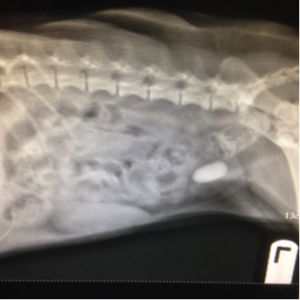Cronulla Veterinary Clinic in Sutherland Shire helps dogs with bladder infections.
Some of us may have experienced the symptoms of a cystitis, or bladder infection. It’s usually characterized by a burning feeling when passing urine and the urge to go pee even though the bladder isn’t really full.
Dogs (and cats as well) can have bladder problems too, and they sometimes have the same symptoms as humans. These symptoms can include urinating very often (but in small amounts), painful urination, and possibly visible blood in the urine (this is known as pollakiuria, dysuria and haematuria).
 Case Study: Cystitis
Case Study: Cystitis
Recently at Cronulla Veterinary Clinic, we saw a 6 year old female cavoodle. She had started wetting the bed at night, was urinating more frequently than normal when she went on walks, and had started urinating on the floor inside the house. All of this was unusual for her. According to her owner, the urine she passed may have been a bit red-tinged.
When she was examined, a smooth stone about the size of a toy lego block was felt in her bladder. An abdominal radiograph confirmed the presence of a large bladder stone.
We started her on a course of antibiotics and extra liquids (mixed in with her food), and scheduled a surgery to have the stone removed (it was too large for her to pass naturally).
During the surgery the bladder was opened and the stone removed. The bladder wall was very thickened and very vascular due to the bladder stone (as can be expected in cases like this). A single large stone with a rough surface was found firmly embedded into the wall of the bladder.
The stone was removed and sent off to a special laboratory in the USA, and the patient was sent home with more antibiotics and pain relief.
 Analysis of the stone revealed this particular stone was made up of 100% struvite. This type of stone often forms in chronically infected urine. With a long course of antibiotics, a special diet, and ongoing monitoring, our little cavoodle will be on the road to recovery.
Analysis of the stone revealed this particular stone was made up of 100% struvite. This type of stone often forms in chronically infected urine. With a long course of antibiotics, a special diet, and ongoing monitoring, our little cavoodle will be on the road to recovery.
What Causes Cystitis?
The most common cause of cystitis in dogs is a bacterial infection. Other causes include bladder stones (which can itself be caused by different problems such as infection, underlying liver problems etc.), tumours and polyps, certain medications, sterile inflammation and anatomical problems. It should be noted that bladder stones are not always palpable on examination like in the case study above.
It is important to seek veterinary attention when your pet shows signs of cystitis. Apart from a physical examination, extra diagnostic tests such as urine analysis, blood tests, and diagnostic imaging (radiographs and/or ultrasound) are often needed to come to the correct diagnosis.
If you notice your dog (or cat) straining to urinate without producing any urine, or only producing a few drops — especially if he is male — take him to the vet immediately. This can be a potentially life threatening condition where a small stone or a clump of crystals blocks the animal’s urethra and he is unable to pass any urine.
